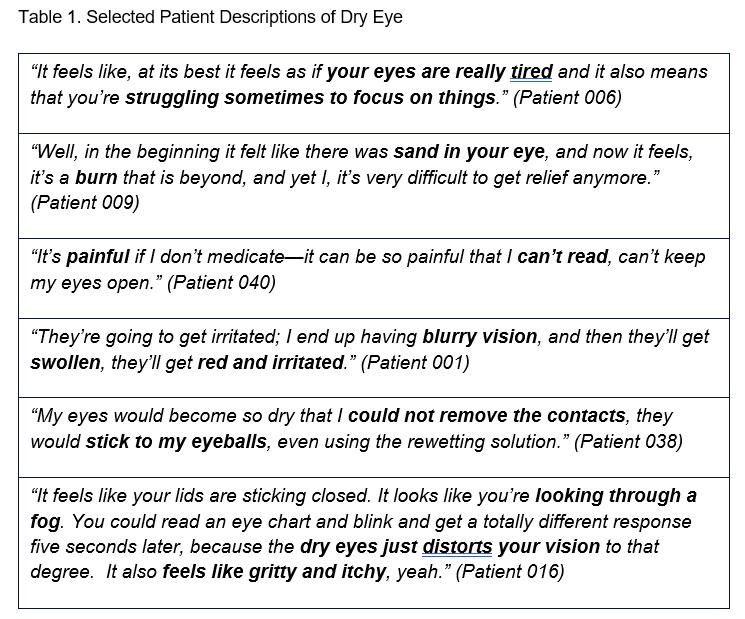Session Information
Date: Monday, November 13, 2023
Title: (1200–1220) Patient Outcomes, Preferences, & Attitudes Poster II
Session Type: Poster Session B
Session Time: 9:00AM-11:00AM
Background/Purpose: Dry eye is one of the most important and prevalent symptoms experienced by patients with Sjögren’s Disease (SJD). The DED-SQ is a 12-item patient reported outcome (PRO) measure developed to assess dry eye disease. The purpose of this study was to identify the most important dry eye concepts to SJD patients and assess content validity of the DED-SQ for use in SJD populations.
Methods: Recruitment was conducted in partnership with the Sjögren’s Foundation, with patients self-selecting for participation. US patients with physician-confirmed diagnosis of SJD and symptoms of dry eye were recruited. Combined concept elicitation (CE) and cognitive interviews (CI) were conducted by phone or online platform with 29 adult SJD patients. During CE, patients reported the most important dry eye symptoms and the impact of dry eye on their daily lives and ability to function. During CI, patients completed the DED-SQ followed by discussion of the relevancy of items, clarity of wording, ease of completion, selection of response options, comprehensiveness, and appropriateness of the recall period. Interviews were audio recorded, transcribed, and anonymized. Thematic analysis of the CE data was conducted using MAXQDA, software designed to organize and facilitate qualitative data analysis, and a codebook, developed from the interview guide and supplemented with additional codes derived from patient comments. An item tracking matrix was used to facilitate a systematic evaluation of the individual items, instructions, recall period and response options to make recommendations for revision.
Results: The study participants were predominantly female (96%), White (79%), and held a bachelor’s degree or higher (90%). On average, participants were 62.8 years of age. Patients reported multiple symptoms of dry eye (Table 1), including general dryness (100%), pain, soreness, or an ache in their eyes (41%), as well as a gritty and/or sandy feeling in their eyes (45%). Patients also reported that dry eye caused their vision to be blurry, distorted, foggy, or fuzzy making it difficult to read text (38%). The reported dry eye symptom descriptions mapped well onto concepts/items in DED-SQ and patients found most items in the DED-SQ relevant to their experiences. Some patients suggested concepts that may be less relevant to SJD (“red eyes” (56%), “itchy eyes” (31%), or “crustiness” (52%) or that may be difficult to distinguish from causes other than SJD (“stinging/sharp feeling”, “burning” (28%)). Apart from items on stinging and burning, patients interpreted the items as intended (≥93%) and found the items easy to answer (≥81%). Patients felt the past 24-hour recall period was appropriate (82%).No additional dry eye symptoms beyond those included in the DED-SQ were identified.
Conclusion: These results reveal dry eye consists of a constellation of symptoms. A PRO covering the multifaceted concept of dry eye may be needed to appropriately assess SJD patients’ experiences. These findings suggest a revised DED-SQ may be fit-for-purpose for assessing dry eye in SJD. Further research can help assess the content validity of a revised DED-SQ in SJD patients.
To cite this abstract in AMA style:
Kruzikas D, Eldred A, Kafka S, Church J, Hammitt K, Koochaki P, O'Donnell C. Sjögren’s Patients’ Experiences and Content Validity of the Dry Eye Disease Symptom Questionnaire (DED-SQ) [abstract]. Arthritis Rheumatol. 2023; 75 (suppl 9). https://acrabstracts.org/abstract/sjogrens-patients-experiences-and-content-validity-of-the-dry-eye-disease-symptom-questionnaire-ded-sq/. Accessed .« Back to ACR Convergence 2023
ACR Meeting Abstracts - https://acrabstracts.org/abstract/sjogrens-patients-experiences-and-content-validity-of-the-dry-eye-disease-symptom-questionnaire-ded-sq/

